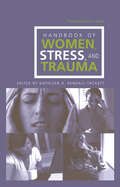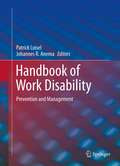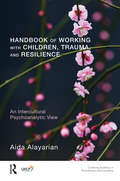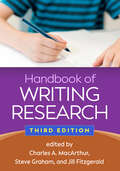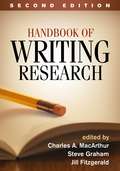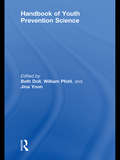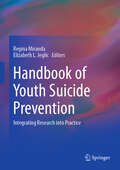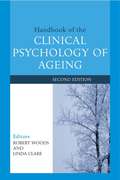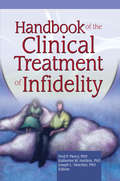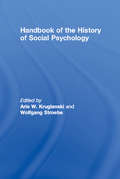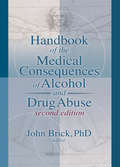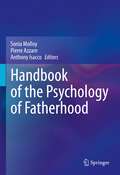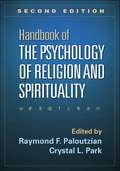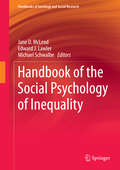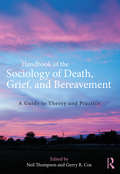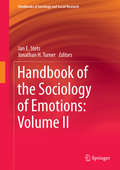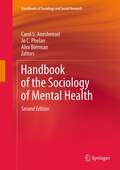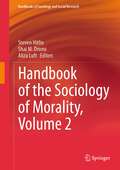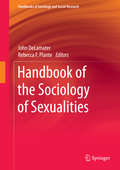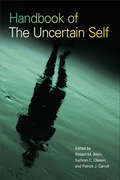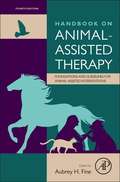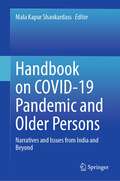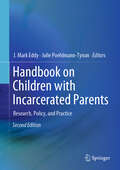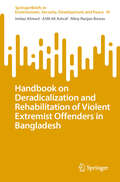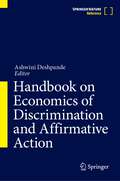- Table View
- List View
Handbook of Women, Stress and Trauma (Psychosocial Stress Series #Vol. 30)
by Kathleen A. Kendall-TackettThe Handbook of Women, Stress and Trauma focuses on the stresses and traumas that are unique to the lives of women. It is the first text to merge research from the fields of trauma and women's health and development. Using a lifespan developmental approach, the text begins by addressing specific issues women face in their lives, drawing upon theories of development and exploring how women's relationships with others buffer - or sometimes cause - stress and trauma. Combining aspects of female development with empirical data from the fields of women's health, family violence and stress and coping, this volume helps sensitive care providers to the specific needs of women exposed to traumatic events.
Handbook of Work Disability
by Johannes R. Anema Patrick LoiselThis book addresses the developing field of Work Disability Prevention. Work disability does not only involve occupational disorders originating from the work or at the workplace, but addresses work absenteeism originating from any disorder or accident. This topic has become of primary importance due to the huge compensation costs and health issues involved. For employers it is a unique burden and in many countries compensation is not even linked to the cause of the disorder. In the past twenty years, studies have accumulated which emphasize the social causes of work disability. Governments and NGOs such as the World Bank, the International Labor Organization, and the Organization for Economic Cooperation and Development have produced alarming reports on the extent of this problem for developed and developing countries. However, no comprehensive book is presently available to help them address this emerging field where new knowledge should induce new ways of management.
Handbook of Working with Children, Trauma, and Resilience: An Intercultural Psychoanalytic View (The\united Kingdom Council For Psychotherapy Ser.)
by Aida AlayarianThis book is a psychoanalytic discussion of the effects of trauma and torture on children, with a specific focus on how professionals can use an approach focused on resiliency rather than vulnerability to help the child reach wellbeing.Aida Alayarian argues that in a world where the torture, maltreatment, and neglect of children shamefully persist, it is incumbent upon all of us to intervene appropriately to put a stop to it. Whether in conference rooms developing a more comprehensive policy to hold perpetrators accountable, or working in clinics where traumatised children and their families seek help, the question of how we act to improve the opportunity for recovery in children and young people subjected to such inhumane treatment should be our primary concern. Handbook of Working with Children, Trauma, and Resilience discusses this salient issue, drawing on psychoanalytic perspectives of the effects of trauma on children, and looking specifically at the case of refugee children and families. Understanding challenging behaviour in traumatised children and the effects of refugee experience on families can help all concerned to offer more appropriate and effective support.
Handbook of Writing Research
by Steve Graham Jill Fitzgerald Charles A. MacArthurSynthesizing the breadth of current research on the teaching and learning of writing, the third edition of this definitive handbook has more than 90% new content, reflecting the growth and dynamism of the field. Leading scholars--including many international voices--review major theories, developmental issues, and instructional approaches for students at all grade levels. Cognitive and sociocultural aspects of writing are explored in depth, as are assessment principles and methods. Issues in teaching students with disabilities, multilingual students, and culturally diverse students are addressed. The volume discusses innovative research methods and educational technologies and identifies key directions for future investigation. New to This Edition Chapters on executive functions in writing; disciplinary writing in math, science, and social studies; the role of vocabulary in writing; and formative assessment. Chapters on source-based writing, source evaluation, and writing development and instruction for African American students. Chapters on sociocultural aspects of writing--from critical literacies to agency and identity, social justice issues, and more--plus an emphasis on integrating cognitive and sociocultural perspectives throughout.
Handbook of Writing Research, Second Edition
by Steve Graham Charles A. Macarthur Jill FitzgeraldThe definitive reference in the field, this volume synthesizes current knowledge on writing development and instruction at all grade levels. Prominent scholars examine numerous facets of writing from sociocultural, cognitive, linguistic, neuroscience, and new literacy/technological perspectives. The volume reviews the evidence base for widely used instructional approaches, including those targeting particular components of writing. Issues in teaching specific populations--including students with disabilities and English learners--are addressed. Innovative research methods and analytic tools are clearly explained, and key directions for future investigation identified. New to This Edition *Chapters on genre instruction, evaluation and revision, argumentative writing, computer-based instruction, and professional development. *Chapters on new literacies, out-of-school writing, translation, and self-regulation. *Many new topics and authors, including more international perspectives. *Multiple chapters connect research findings to the Common Core writing standards. See also the editors' Best Practices in Writing Instruction, Second Edition, an accessible course text and practitioner's guide.
Handbook of Youth Prevention Science
by Beth DollThe Handbook of Youth Prevention Science describes current research and practice in mental health preventive interventions for youth. Traditional prevention research focused on preventing specific disorders, e.g. substance abuse, conduct disorders, or criminality. This produced "silos" of isolated knowledge about the prevention of individual disorders without acknowledging the overlapping goals, strategies, and impacts of prevention programs. This Handbook reflects current research and practice by organizing prevention science around comprehensive systems that reach across all disorders and all institutions within a community. Throughout the book, preventive interventions are seen as complementary components of effective mental health programs, not as replacements for therapeutic interventions. This book is suitable for researchers, instructors and graduate students in the child and adolescent mental health professions: school psychology, school counseling, special education, school social work, child clinical psychology and the libraries serving them. It is also suitable for graduate course work in these fields.
Handbook of Youth Suicide Prevention: Integrating Research into Practice
by Regina Miranda Elizabeth L. JeglicThis handbook examines research on youth suicide, analyzes recent data on suicide among adolescents, and addresses the subject matter as a serious public health concern. The book explores the research on youth suicide, examining its causes, new and innovative ways of determining suicide risk, and evidence-based intervention and prevention strategies. In addition, it focuses on specific under-studied populations, including adolescents belonging to ethnic, racial, and sexual minority groups, youth involved in the criminal justice system, and adolescents in foster care. The book discusses how culturally informed and targeted interventions can help to decrease suicide risk for these populations.Key areas of coverage include:Early childhood adversity, stress, and developmental pathways of suicide risk.The neurobiology of youth suicide.Suicide, self-harm, and the media.Assessment of youth suicidal behavior with explicit and implicit measures.Suicide-related risk among immigrant, ethnic, and racial minority youth.LGBTQ youth and suicide prevention.Psychosocial treatments for ethnoculturally diverse youth with suicidal thoughts and behaviors.Technology-enhanced interventions and youth suicide prevention. The Handbook of Youth Suicide Prevention is an essential resource for researchers, professors, graduate students as well as clinicians, therapists, and other professionals in developmental psychology, social work, public health, pediatrics, family studies, child and adolescent psychiatry, school and educational psychology, and all interrelated disciplines.
Handbook of the Clinical Psychology of Ageing
by Robert T. Woods Linda ClareThe first authoritative reference on clinical psychology and aging, the Handbook of the Clinical Psychology of Ageing was universally regarded as a landmark publication when it was first published in 1996. Fully revised and updated, the Second Edition retains the breadth of coverage of the original, providing a complete and balanced picture of all areas of clinical research and practice with older people. Contributions from the UK, North America, Scandinavia and Australia provide a broad overview of the psychology of aging, psychological problems (including depression, anxiety, psychosis, and dementia), the current social service context, and assessment and intervention techniques.
Handbook of the Clinical Treatment of Infidelity
by Joseph L. Wetchler Fred P Piercy Katherine Milewski HertleinHelp your clients&’ relationships survive infidelity!In the Handbook of the Clinical Treatment of Infidelity, a panel of seasoned experts reflects on issues central to affairs, and on how to help couples heal and learn from them. First, editors Fred P. Piercy, Katherine M. Hertlein, and Joseph L. Wetchler provide an essential overview of infidelity theory, research, and treatment. They discuss the effect of infidelity on couples and delineate three types of infidelity-emotional, physical, and infidelity including aspects of both. They review the relatively new role of the Internet in infidelity and explore infidelity within the context of comarital relationships. Finally, they discuss the overarching theories and common models used in infidelity treatment.Also in the Handbook of the Clinical Treatment of Infidelity: Susan M. Johnson, the co-developer of Emotionally Focused Therapy (EFT), discusses affairs through the lens of attachment theory, and shows how EFT provides a way to acknowledge and express pain, remorse, and regret, and to repair this attachment bond. David Moultrup takes a Bowenian approach to infidelity, focusing attention on the underlying dynamics of the emotional system Frank Pittman and Tina Pittman Wagers outline cultural myths about affairs and do their share of debunking Adrian Blow discusses how to help couples directly address their pain-and the challenges of the healing process Brian Case highlights the role of apology and forgiveness in the healing process Frank Stalfa and Catherine Hastings focus on the treatment of "accusatory suffering"-a spouse&’s obsessive holding onto and retaliating for an affair long after it has ended, and despite the offending partner&’s repeated apologies and attempts at restitution Don-David Lusterman discusses individuals who have suppressed or denied traumatic stress reactions to their partner&’s affair, and how to help them Scott Johnson discusses myths about affairs, from who is cheating on whom, to whether men really have more affairs than women, to the blame-filled language of "affairs," "betrayal," and "infidelity," asking us to think more systematically about affairs and to see the dynamics of extra dyadic relationships as more complex and nuanced than they are typically portrayed in the literature Joan Atwood provides an overview of Internet infidelity-the factors influencing one&’s involvement in this type of infidelity, and some considerations for therapists Tim Nelson, Fred Piercy, and Doug Sprenkle report on the results of a multi-phase Delphi study that explored what infidelity experts say are the critical issues, interventions, and gender differences in the treatment of Internet infidelity Monica Whitty and Adrian Carr draw upon Klein&’s object relations theory and discuss how this might influence the way people rationalize their Internet infidelity Emily Brown outlines the concept of the Split Self Affair-discussing its origins, characteristics, and implications for individuals and couples, and providing detailed information on how to work with these couples in therapy Michael Bettinger presents extra dyadic relationship as a fact, rather than a problem, within many gay male relationships-a discussion that shows how gay male polyamory can work as an alternative to the heterosexual model of emotional and sexual exclusivity in romantic dyadic relationships Katherine Hertlein and Gary Skaggs report on the results of a study that assessed the level of differentiation and one&’s engagement in extra dyadic relationshipsThe Handbook of the Clinical Treatment of Infidelity is essential reading for today&’s (and tomorrow&’s) clinicians who work with couples. Make it a p
Handbook of the History of Social Psychology
by Arie W. Kruglanski Wolfgang StroebeFor the first time in the history of social psychology, we have a handbook on the history of social psychology. In it, leading luminaries in the field present their take on how research in their own domains has unfolded, on the scientists whose impact shaped the research agendas in the different areas of social psychology, and on events, institutions and publications that were pivotal in determining the field’s history. Social psychology’s numerous subfields now boast a rich historical heritage of their own, which demands special attention. The Handbook recounts the intriguing and often surprising lessons that the tale of social psychology’s remarkable ascendance has to offer. The historical diversity is the hallmark of the present handbook reflecting each of this field’s domains unique evolution. Collectively, the contributions put a conceptual mirror to our field and weave the intricate tapestry of people, dynamics and events whose workings combined to produce what the vibrant discipline of social psychology is today. They allow the contemporary student, scholar and instructor to explore the historical development of this important field, provide insight into its enduring aims and allow them to transcend the vicissitudes of the zeitgeist and fads of the moment. The Handbook of the History of Social Psychology provides an essential resource for any social psychologist’s collection.
Handbook of the Medical Consequences of Alcohol and Drug Abuse
by John BrickThe essential newly-expanded reference that needs to be on the desk of every health care professional who encounters substance abusers.Handbook of the Medical Consequences of Alcohol and Drug Abuse, Second Edition is the newly-updated classic reference text that provides even more detailed and expanded information on the pharmacological, toxicological, and neuropsychological consequences of alcohol and drug abuse. Eight new chapters of crucial information have been added. Written by leading experts in the fields of medical physiology, psychopharmacology, and neuropsychology, this valuable resource provides the detailed alcohol and drug information health professionals in all fields need to know. Handbook of the Medical Consequences of Alcohol and Drug Abuse, Second Edition greatly expands on the expert information provided in the first edition. This text provides reviews of the cardiovascular, neurological, pulmonary, gastrointestinal, psychological, and hepatic effects of commonly abused drugs. The book also provides in-depth explanations of the mechanisms by which these psychoactive drugs exert their biobehavioral effects as well as current thinking about—and definitions of—abuse, dependence, and alcohol/drug use. The Handbook of the Medical Consequences of Alcohol and Drug Abuse, Second Edition includes vital information on: alcohol, including definitions of alcohol use, abuse, and dependence the relationship between alcohol and accidental injuries, alcohol’s effect on skeletal and major organ systems, and its effect on risk factors for certain cancers effects of alcohol and other drugs on neuropsychological function the effects of alcohol on neuron signaling, neurotransmitter function, and alcoholic brain damage and cognitive dysfunction fetal alcohol effects chronic effects of marijuana use on psychological and physical health, including a fair and balanced discussion of the medical marijuana issue the consequences of opiate abuse and methadone pharmacotherapy, including a comparison of the effects of methadone and heroin on organ systems cocaine’s history, the various forms of the drug, and the adverse effects of cocaine on cardiovascular, neurologic, and pulmonary systems the medical consequences of inhalants ranging from benzene to xylene the prenatal effects of nicotine, cocaine, marijuana, and opiates terminology that appears in the current literature on alcohol New topics in the Handbook of the Medical Consequences of Alcohol and Drug Abuse, Second Edition include chapters discussing: chemical dependency in psychiatric patients medical consequences of steroids OTC medications hallucinogens health effects of tobacco, nicotine, and exposure to tobacco smoke interactions of alcohol with other drugs and other medications periodontal effects of alcohol and drug abuse in the oral cavity imaging studies of structural brain changes The Handbook of the Medical Consequences of Alcohol and Drug Abuse, Second Edition is an invaluable resource for physicians, scientists, nurses, psychologists, and alcohol and drug counselors.
Handbook of the Psychology of Fatherhood
by Anthony Isacco Sonia Molloy Pierre AzzamThis handbook examines the psychology of fatherhood throughout the lifespan and across multiple contexts. It synthesizes the trajectory of research and theorization of fathering that has traditionally dominated fatherhood literature. The book explores fathering within the developmental stages of children, from infancy to adulthood. In addition, it addresses the health and well-being of fathers from the perinatal period onward, with a focus on isolation, loss, trauma, and mental and physical health. The book emphasizes positive fatherhood and masculinity, thereby offering new perspectives of fatherhood. It synthesizes cutting-edge research on the intersectionality of fathering and provides knowledge of fatherhood for diverse populations, including military, LGBTQ, and fathers on the margins. The handbook reviews clinical assessment as well as community-based prevention and intervention strategies for issues of fatherhood and examines directions for future public policy and on-the-ground work. It offers recommendations for promoting the health and well-being of fathers and their families from multiple perspectives. Key areas of coverage include:Historical, multicultural, and future directions in the research of fatherhood.Fatherhood and child development, from infancy to emerging adulthood.Grandfathering and adult children.Fatherhood and men’s mental and physical health and well-being.Positive masculinity and fatherhood. The Handbook of the Psychology of Fatherhood is an invaluable resource for researchers, clinicians and practitioners, and policy advocates as well as graduate students in developmental psychology, social work, public health, pediatrics, human development, family studies, child and adolescent psychiatry, school and educational psychology, and all interrelated disciplines.
Handbook of the Psychology of Religion and Spirituality, Second Edition
by Raymond F. Paloutzian Crystal L. ParkWidely regarded as the definitive reference, this volume comprehensively examines the psychological processes associated with religion and spirituality. Leading scholars from multiple psychological subdisciplines present developmental, cognitive, social psychological, cultural, and clinical perspectives on this core aspect of human experience. The forms and functions of religious practices and rituals, conversion experiences, and spiritual struggles are explored. Other key topics include religion as a meaning system, religious influences on prosocial and antisocial behavior, and connections to health, coping, and psychotherapy.New to This Edition*Two chapters on cross-cultural issues.*Chapters on spiritual goals, emotional values, and mindfulness.*Reflects significant theoretical and empirical developments in the field.*Many new authors and extensively revised chapters.*Robust index amplifies the volume's usefulness as a reference tool.
Handbook of the Social Psychology of Inequality
by Jane D. Mcleod Michael Schwalbe Edward J. LawlerThis volume provides the first comprehensive overview of social psychological research on inequality for a graduate student and professional audience. Drawing on all of the major theoretical traditions in sociological social psychology, its chapters demonstrate the relevance of social psychological processes to this central sociological concern. Each chapter in the volume has a distinct substantive focus, but the chapters will also share common emphases on: * The unique contributions of sociological social psychology * The historical roots of social psychological concepts and theories in classic sociological writings * The complementary and conflicting insights that derive from different social psychological traditions in sociology. This Handbook is of interest to graduate students preparing for careers in social psychology or in inequality, professional sociologists and university/college libraries.
Handbook of the Sociology of Death, Grief, and Bereavement: A Guide to Theory and Practice
by Neil Thompson Gerry R. CoxThe Handbook of the Sociology of Death, Grief, and Bereavement sets issues of death and dying in a broad and holistic social context. Its three parts explore classical sociology, developments in sociological thought, and the ways that sociological insights can be useful across a broad spectrum of grief-related topics and concerns. Guidance is given in each chapter to help spur readers to examine other topics in thanatology through a sociological lens. Scholars, students, and professionals will come away from the handbook with a nuanced understanding of the social context –cultural differences, power relations, the role of social processes and institutions, and various other sociological factors – that shape grief experiences.
Handbook of the Sociology of Emotions: Volume II
by Jonathan H. Turner Jan E. StetsHandbook of the Sociology of Emotions Volume II presents all new chapters in the ever developing area of the sociology of emotions. The volume is divided into two sections: Theoretical Perspectives and Social Arenas of Emotions. It reviews major sociological theories on emotions, which include evolutionary theory, identity theory, affect control theory, social exchange theory, ritual theory, and cultural theory among others. Social arenas where emotions are examined include, but are not limited to, the economy and the workplace, the family, mental health, crime, sports, technology, social movements and the field of science. All the chapters review the major theories and research in the area and each chapter ends with some discussion of directions for future research. The Sociology of Emotions is a fast growing and vital field in the broad discipline of Sociology. This volume II follows the Handbook of the Sociology of Emotions which was first published in 2006. In 2008, this first handbook received the "Outstanding Recent Contribution" in the Emotions Section of the American Sociological Association. With contributions from leading scholars from different areas in the discipline, such as neurosociology, culture, economics, mental health, gender, social movements, discussing state-of-art theory and research on emotions in sociology this volume will generate wider appeal to the sociological community.
Handbook of the Sociology of Mental Health
by Carol S. Aneshensel Alex Bierman Jo C. PhelanThis second edition of the Handbook of the Sociology of Mental Health features theory-driven reviews of recent research with a comprehensive approach to the investigation of the ways in which society shapes the mental health of its members and the lives of those who have been diagnosed as having a mental illness The award-winning Handbook is distinctive in its focus on how the organization and functioning of society influences the occurrence of mental disorder and its consequences. A core issue that runs throughout the text concerns the differential distribution of mental illness across various social strata, defined by status characteristics such as gender, race/ethnicity, socioeconomic status, and age. The contributions to this volume shed light on the social, cultural, and economic factors that explain why some social groups have an elevated risk of disorder. They also address the social repercussions of mental disorder for individuals, including stigmatization within the larger society, and for their families and social networks. The second edition of this seminal volume includes substantial updates to previous chapters, as well as seven new chapters on: -The Individual's Experience of Mental Illness.--The Medicalization of Mental Illness.---Age, Aging, and Mental Health.- -Religion and Mental Health.- -Neighborhoods and Mental Health.- -Mental Health and the Law--and Public Beliefs about Mental Illness.
Handbook of the Sociology of Morality, Volume 2 (Handbooks of Sociology and Social Research)
by Steven Hitlin Shai M. Dromi Aliza LuftThis handbook articulates how sociology can re-engage its roots as the scientific study of human moral systems, actions, and interpretation. This second volume builds on the successful original volume published in 2010, which contributed to the initiation of a new section of the American Sociological Association (ASA), thus growing the field. This volume takes sociology back to its roots over a century ago, when morality was a central topic of work and governance. It engages scholars from across subfields in sociology, representing each section of the ASA, who each contribute a chapter on how their subfield connects to research on morality. This reference work appeals to broader readership than was envisaged for the first volume, as the relationship between sociology as a discipline and its origins in questions of morality is further renewed. The volume editors focus on three areas: the current state of the sociology of morality across a range of sociological subfields; taking a new look at some of the issues discussed in the first handbook, which are now relevant in sometimes completely new contexts; and reflecting on where the sociology of morality should go next. This is a must-read reference for students and scholars interested in topics of morality, ethics, altruism, religion, and spirituality from across the social science.
Handbook of the Sociology of Sexualities
by Rebecca F. Plante John DelamaterThis volume provides researchers and scholars with a broad overview of the contributions of social psychologists and sociologists to the study of sexual relationships and sexual expression across the life course. These contributions include analyses of the dynamics of several types of contemporary sexual relationships - e. g. , short-term, long-term non-exclusive, and committed. Chapters analyze the influence of major social institutions - e. g. , religion, family and economy - on them. The content and scope of this volume have been carefully chosen to balance coverage of traditional emphases - dating, marriage, commercial sex work, sex education - with new and cutting edge materials - embodiment, Trans*, asexualities. Sections review major theoretical perspectives and the principal research methods. Coverage of sexual orientation is integrated throughout. This volume provides excellent resources for anyone interested in research on sexualities.
Handbook of the Uncertain Self
by Patrick J. Carroll Robert M. Arkin Kathryn C. OlesonThis Handbook explores the cognitive, motivational, interpersonal, clinical, and applied aspects of personal uncertainty. It showcases both the diversity and the unity that defines contemporary perspectives on uncertainty in self within social and personality psychology. The contributions to the volume are all written by distinguished scholars in personality, social psychology, and clinical psychology united by their common focus on the causes and consequences of self-uncertainty. Chapters explore the similarities and differences between personal uncertainty and other psychological experiences in terms of their nature and relationship with human thought, emotion, motivation, and behavior. Specific challenges posed by personal uncertainty and the coping strategies people develop in their daily life are identified. There is an assessment of the potential negative and positive repercussions of coping with the specific experience of self-uncertainty, including academic, health, and relationship outcomes. Throughout, strategies specifically designed to assist others in confronting the unique challenges posed by self-uncertainty in ways that emphasize healthy psychological functioning and growth are promoted. In addition, the contributions to the Handbook touch on the psychological, social, and cultural context of the new millennium, including concepts such as Friedman’s "flat world," confidence, the absence of doubt in world leaders, the threat of terrorism since 9/11, the arts, doubt and religious belief, and views of doubt as the universal condition of humankind. The Handbook is an invaluable resource for researchers, practitioners, and senior undergraduate and graduate students in social and personality psychology, clinical and counseling psychology, educational psychology, and developmental psychology.
Handbook on Animal-Assisted Therapy: Foundations and Guidelines for Animal-Assisted Interventions
by Aubrey FineIn the 10 years since the first edition of Handbook on Animal-Assisted Therapy published, the field has changed considerably. The third edition of the Handbook highlights advances in the field, with 10 new chapters and over 50% new material. In reading this book, therapists will discover the benefits of incorporating animal assisted therapy into their practice, how to design and implement animal assisted interventions, and the efficacy of animal assisted therapy with different disorders and patient populations. Coverage includes the use of AAT with children, families, and the elderly, in counseling and psychotherapy settings, and for treating a variety of specific disorders.
Handbook on COVID-19 Pandemic and Older Persons: Narratives and Issues from India and Beyond
by Mala Kapur ShankardassThis handbook provides an in-depth analysis of the impact of the Covid-19 pandemic on older people across different countries, focusing on important issues affecting ageing societies. It presents an analytical framework of various emerging concerns affecting societies, transforming of social relationships, bringing in of new health problems, including mental health, elder abuse, impact on intergenerational relationships and emotional and psychological matters. It explores the choices of governments to address the arising issues, indicates different community responses and discusses the experiences of older people in handling of problems cropping up, which affect their quality of life in various ways. The book offers readers new dimensions of the issues nations face with possible similar solutions and ways to handle the concerns. The book is valuable for researchers, practitioners, and students pursuing anthropology, sociology, psychology, and gerontology. The book offers many disciplinary international and national perspectives to understand the relationship between the pandemic and older people.
Handbook on Children with Incarcerated Parents: Research, Policy, and Practice
by Julie Poehlmann-Tynan J. Mark EddyThe second edition of this handbook examines family life, health, and educational issues that often arise for the millions of children in the United States whose parents are in prison or jail. It details how these youth are more likely to exhibit behavior problems such as aggression, substance abuse, learning difficulties, mental health concerns, and physical health issues. It also examines resilience and how children and families thrive even in the face of multiple challenges related to parental incarceration. Chapters integrate diverse; interdisciplinary; and rapidly expanding literature and synthesizes rigorous scholarship to address the needs of children from multiple perspectives, including child welfare; education; health care; mental health; law enforcement; corrections; and law. The handbook concludes with a chapter that explores new directions in research, policy, and practice to improve the life chances of children with incarcerated parents. Topics featured in this handbook include:Findings from the Fragile Families and Child Wellbeing Study.How parental incarceration contributes to racial and ethnic disparities and inequality.Parent-child visits when parents are incarcerated in prison or jail.Approaches to empowering incarcerated parents of color and their families.International advances for incarcerated parents and their children. The second edition of the Handbook on Children with Incarcerated Parents is an essential reference for researchers, professors, clinicians/practitioners, and graduate students across developmental psychology, criminology, sociology, law, psychiatry, social work, public health, human development, and family studies. “This important new volume provides a cutting-edge update of research on the impact of incarceration on family life. The book will be an essential reference for researchers and practitioners working at the intersections of criminal justice, poverty, and child development.” Bruce Western, Ph.D., Columbia University “The comprehensive, interdisciplinary focus of this handbook brilliantly showcases the latest research, interventions, programs, and policies relevant to the well-being of children with incarcerated parents. This edition is a ‘must-read’ for students, researchers, practitioners, and policy-makers alike who are dedicated to promoting the health and resilience of children affected by parental incarceration.” Leslie Leve, Ph.D., University of Oregon
Handbook on Deradicalization and Rehabilitation of Violent Extremist Offenders in Bangladesh (SpringerBriefs in Environment, Security, Development and Peace #41)
by Imtiaz Ahmed Niloy Ranjan Biswas ASM Ali AshrafThis Handbook provides a theory-driven and policy-relevant analysis of terrorist offenders' deradicalization processes. It is the product of a multi-year collaboration between security studies scholars and counterterrorism practitioners. It offers a multidimensional strategy for the physical and cognitive disengagement of terrorists. It also charts a path for the community-based social reintegration of rehabilitated extremist offenders. The Handbook is targeted for both academics and practitioners in the field of counterterrorism. Those specializing in South Asia and the Global South will find this book a useful reference tool to comprehend and design the complex deradicalization processes and transform them into implementable practices.
Handbook on Economics of Discrimination and Affirmative Action
by Ashwini DeshpandeThis Handbook deals with theoretical and empirical evidence on the economics of discrimination and affirmative action across the world, assessed over a variety of social identities, such as caste, race, ethnicity, gender, disability, age, tribal status. It also outlines methodological advances in this area, with plenty of additional references for the interested reader. It combines theoretical frameworks developed in the West with historical writings about discrimination and social justice from primarily Indian philosophers, aspects which are typically not found under one roof. It offers the reader a combination of insights into theories across a range of disciplines, as well as evidence, data –both quantitative and qualitative, in addition to the latest methodological advances in the estimation of discrimination – econometric, experimental, mixed-methods.
